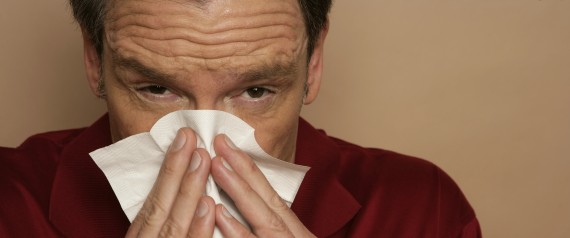
By Jessica Levine[1] for Men's Health
If you don't fast-forward commercials, you've seen this one from Zicam[2] : A pretty woman daintily sneezes into her elbow when out of nowhere a snot-nosed monster of a cold is chasing her. "That first sneeze. You have a pre-cold," the voiceover says. She runs. He corners her in a dark alley. She panics.
You've been there. Adults average two to four colds a year, and the typical upper respiratory infection takes up to 10 days to get over. But that first sniffle, throat tickle or cough doesn't have to be all doom and gloom. In this case, a heroic box of Zicam saved the day, of course, flattening Snot-Nose like a semi. But it turns out there are other cold-fighting heroes out there, too.
1. Pop zinc. It's not false advertising. Research shows taking zinc (the active ingredient in Zicam) lozenges, tablets or syrup within a day of your first symptoms can reduce both their severity and duration. Taking a supplement regularly can help, too.
More from Men's Health:
Fix Anything with Massage
The Best Allergy Medicines
What Men Can Learn from Women about Health[3] [4] [5]
2. Then find Zen. "When you're under stress, your immune system ends up under-reacting to viral and bacterial infections," says Sandra Adamson Fryhofer, M.D., internist and past president of the American College of Physicians. Perhaps that's why University of Wisconsin researchers found mindfulness meditation training reduced the incidence, duration and severity of a cold by 35 to 60 percent.
3. Jack up your H2O intake. "Hydration helps keep your nasal passages moist, so they can actually get rid of little particles from bacteria," Fryhofer says.
4. Make like Grandpa and gargle. Evidence shows gargling with water a few times a day during cold and flu season may also help flush out bugs.
5. Pop a probiotic. In a recent study, probiotic supplements shortened the duration of a cold from six days to four, made symptoms a third less severe and halved the number of days subjects stayed home. Look for the strains LGG and BB12.
Click over to Men's Health for the full list.[6]
References
- ^ Jessica Levine (news.menshealth.com)
- ^ this one from Zicam (www.youtube.com)
- ^ Fix Anything with Massage (www.menshealth.com)
- ^ The Best Allergy Medicines (www.menshealth.com)
- ^ What Men Can Learn from Women about Health (www.menshealth.com)
- ^ Click over to Men's Health for the full list. (news.menshealth.com)
- ^ Send us a tip (www.huffingtonpost.com)
- ^ Send us a photo or video (www.huffingtonpost.com)
- ^ Suggest a correction (www.huffingtonpost.com)

0 comments:
Post a Comment